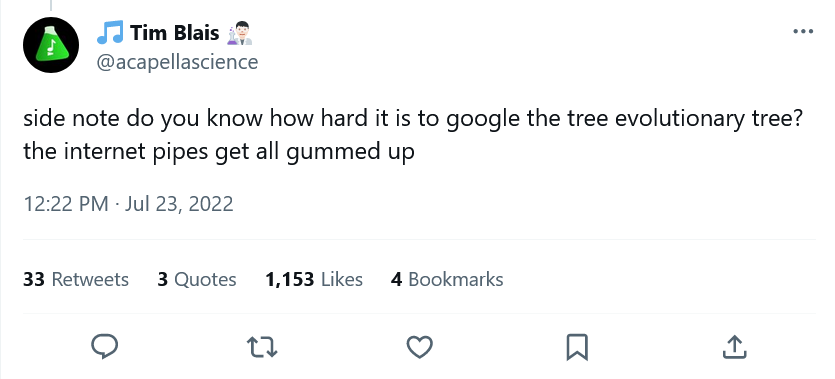Information camouflage
About a thing that makes finding some information really hard

I do a lot of research for my job and over time built a vocabulary for researching concepts. This one comes up a lot so I figured I'd get it written down.
Information camouflage is when piece of information A has a name similar to another, very different, much more popular piece B. This makes searching for A difficult because you always get results for B instead.
For example, I wanted to find a museum about zoos. Famous zookeepers, zookeeping tools, how habitats are designed, etc. All searches for a "museum of zoos" (MOZ) instead gets you animal museums or combination zoo/museums. Way more people are interested in combination zoo/museums, which camouflages the more niche MOZ.
Other examples of information camouflage:
- Computational fluid dynamics (CFD) simulations of blenders, camouflaged by CFD simulations in Blender.
- "Excel for software engineers", camouflaged by guides for developing Excel extensions.1
- Anything about the J language is camouflaged by things like JLang, Java, Javascript, and the letter J.
- Chicago, Zimbabwe is camouflaged by travel between Chicago, Illinois and Zimbabwe, Zimbabweans visiting Chicago, etc.
These topics all have material available, but there's so much more material about the camouflaging topic. More people, on searching "Chicago Zimbabwe", are interested in flights than in the suburb of Kweke.
A similar concept is Search engine camouflage, when a term is hard to find because it messes with the search engine. For example, Twitter strips out +'s from search terms, so you can't search for C++.
Dealing with Information camouflage
I start by finding terms that are closely related to the camouflaged term but not the camouflager. Take the blender simulation example. The problem is that "blender" is the name of software. I'd look for terms that are conceptually very close to appliance blenders but very far from the Blender software:
CFD simulation "immersion" blender2
That finds a couple articles, but it now camouflages with "immersive visualizations in Blender". I'm better off avoiding the word blender entirely and searching for simulations of similar appliances:
CFD simulation food processor
That search finds more relevant material. Food processors are a little further from blenders, though, so if I really need blender CFDs it's time for graph traversal. Normally we don't use the relationship structures embedded in a topic because search engines are Just That Good, but they're more reliable in this case. I'd start from a food processor resources and look for papers by the same author, or other content on the same blog, anything that groups "related" things together I can use. That's a good research trick in general. Graph exploring turns up a lot of material you wouldn't otherwise find in a search engine, or even think to search for. Research is just as much about the serendipitous discoveries as finding what you need, so it's good to work in a way that opens you up to surprises.
For something like a museum of zoos, I don't even know what the similar terms are. So I'd switch to a methodical top-down approach: find relevant taxonomies and work through them. Museum directories, library of congress classification, the AZA and AAM professional organizations. This isn't my first approach because it's a lot of work to sift through them, but it's more likely to have some kind of signal than before.
Past that comes the approach that is paradoxically the best and worst approach: Knowing a Guy.3 99% of research techniques are crude replacements for Knowing a Guy. If you Know a Guy, you can ask the Guy your question, and they'll just give you the answer, or at least give you better places to look. Presumably, though, you're doing research because you don't Know a Guy. So it's more about Finding and then Asking a Guy, which is a lot harder and more inconvenient and adds a lot of latency to your "queries" while you wait to see if they'll even respond. Not everybody likes being the Known Guy, which is understandable.
(I've become the Known Guy for a lot of people wrt software history and formal methods, which is really cool and a role I love playing. People ping me because they expect that 1) I'll know the answer or at least where to look, and 2) I'm accessible. I'm super happy I've been able to build that reputation!)
A more scalable analog to Knowing a Guy: crowdsourcing! This works better if you have a large-enough platform, so you can just drop a tweet and people will answer you. Not something available to anyone. Unless you go for the nuclear option:
Offer money.
Want to try something: I will pay 30 USD to the first person who can DM me information on a real-world museum about zookkeeping. NOT a combination museum/zoo. A museum specifically about the topic of zoos and zookeepers.
— Inactive; Bluesky is @hillelwayne(dot)com (@hillelogram) April 20, 2021
(Note: said museum might not exist)
That finally, finally, got me an answer! There's apparently a museum of zoos in Russia.
Hope you enjoyed this quick peek into how I think about research! It helped me formalize a lot of my intuitions about the process too. There's a lot I can talk about wrt research, though I know this is a software newsletter so would keep it to an absolute minimum. Let me know if you want to see more!

Add a comment: